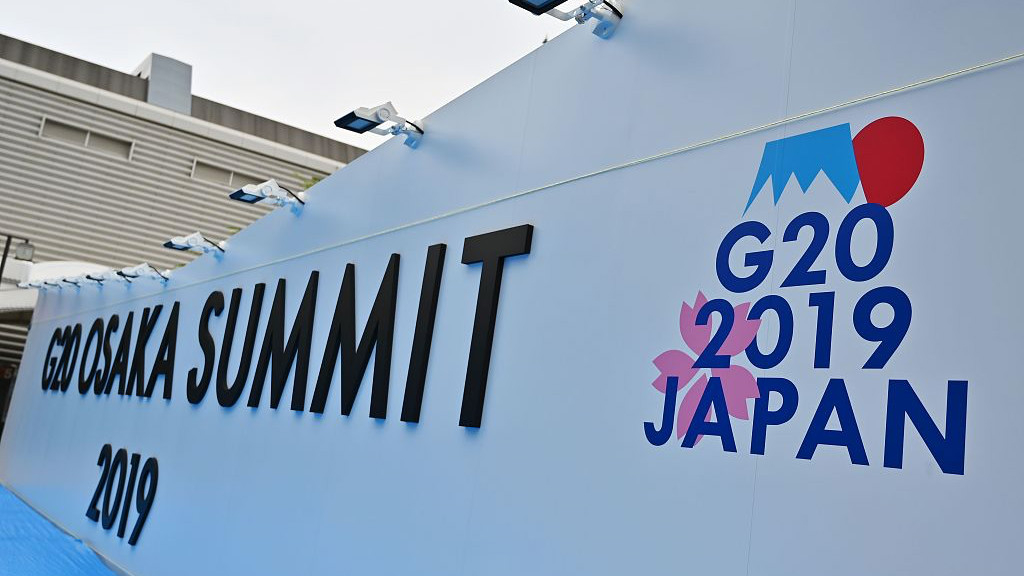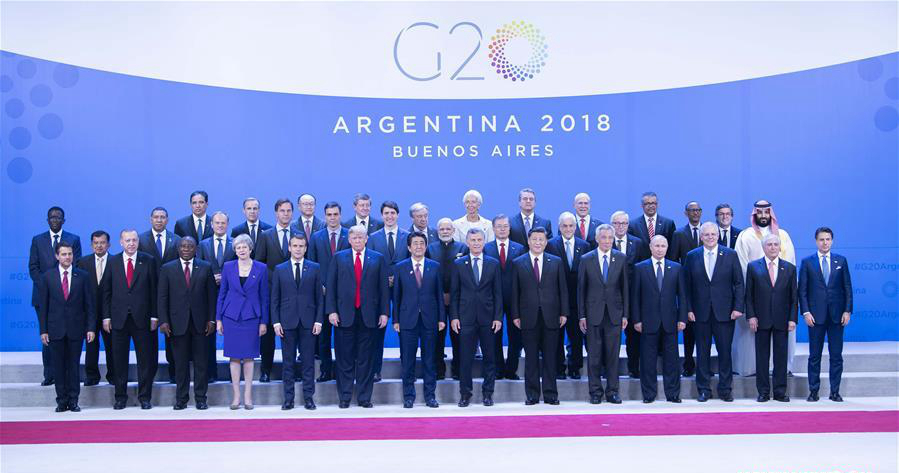

Editor's Note: The following is an edited translation of a commentary that first appeared on the Chinese-language website "Commentaries on International Affairs" on June 25. The article does not necessarily reflects the views of CGTN.
Chinese President Xi Jinping will go to Osaka, Japan, on Thursday to attend the 14th summit of the Group of Twenty (G20) leaders. This is the seventh time that President Xi Jinping has either attended or hosted a G20 summit. At previous summits, Chinese leaders put forward China's ideas for improving global economic governance, contributed Chinese wisdom and demonstrated the consistent importance China attaches to participating in G20 cooperation and its due responsibility as a major country of the world.
The G20 summit was born in hard times. In 2008, the financial crisis that originated in the United States swept the world. In order to prevent the crisis from worsening into a global economic depression, the G20 leaders discussed strategies in Washington for the first time, while developing countries and emerging economies played an important role, and member economies adopted concerted actions including monetary stimulus, fiscal expansion and regulatory reforms. The moves kept the crisis under effective control and saved market confidence.
In the past 10 years, the G20 summit has gradually shifted from being a "crisis response mechanism" to a "long-term governance mechanism" for the global economy, and has become one of the important multilateral mechanisms in the international economic field. However, with the rise of unilateralism, protectionism and counter-globalization, especially the escalation of trade frictions provoked unilaterally by the United States, the G20 members have been affected to varying degrees, which brings more complex and grim challenges to the G20 Osaka Summit.
According to the Organization for Economic Cooperation and Development (OECD), in the first quarter of this year, the exports of many G20 members shrank and their economic growth was weak. South Korea, Brazil, Russia, Indonesia, Japan and other member economies saw a sharp decline in exports, as compared with the previous quarter. The Bank of Korea announced that as of May this year, the country's exports had fallen for six consecutive months, resulting in a 0.3 percent quarter-on-quarter decline in GDP.

Banners for the G20 summit are displayed on a street in Osaka, Japan, June 24, 2019. /VCG Photo
Some South Korean media believe that this is largely because South Korean exporters depend heavily on China and the U.S. South Korea is very sensitive to global economic pressures and is known as a "canary" in the global economy. The decline of the South Korean economy may indicate the risk of a global recession or even a crisis.
Major organizations and institutions have lowered their global growth expectations. The International Monetary Fund believes that global trade growth may slow to the lowest level since the financial crisis due to trade frictions. The World Bank's Global Economic Outlook report, released in June, further lowered the global economic growth forecast for 2019 to 2.6 percent from a previous forecast of 2.9 percent made in January. German central bank governor, Jens Weidmann, has described the current trade friction as "global headwinds" and estimated that the U.S.-China trade friction may reduce world trade by one percent in the medium term. A recent report by Morgan Stanley said that the global economy could start to decline in nine months' time at the earliest.
In the face of this urgent crisis and uncertainty, all parties concerned highly anticipate that the G20 members would show to the world their confidence and courage to meet the challenges in a concerted effort. Therefore, it is especially important to regain the initial focus of the G20 summit and remain true to its founding mission.
The G20 covers 66 percent of the world population and accounts for 85 percent of the global economy, 75 percent of international trade worldwide and 85 percent of global investment. The history of the G20 summit over more than 10 years has fully proved that as long as member economies were able to seek common ground while reserving differences, coordinate their positions and adhere to openness and cooperation, the G20 multilateral mechanism was fully capable of defusing crises and putting the world economy on the right track.

Chinese President Xi Jinping (6th R, front) poses for a group photo with other leaders attending the 13th summit of the Group of 20 (G20) in Buenos Aires, Argentina, November 30, 2018. /Xinhua
As one of the G20 members, China has elaborated on a series of ideas and positions that have played an important role in controlling financial panic and properly dealing with the crisis. At the G20 Hangzhou Summit in 2016, China gave a "prescription" for the growth of the world economy, including strengthening macroeconomic policy coordination, developing innovative ways, mining growth momentum, improving global economic governance, building an open world economy and promoting sustainable and inclusive growth.
These proposals demonstrated China's attitude as a responsible major country and won unanimous praise from the international community. In the past few years, China has always practiced these ideas in a manner unifying knowledge and action, and has become a stable valve in the global economic storm and a source of dynamic force for world economic growth.
In fact, these programs and propositions by China reflect the voices of countries pursuing progress and development. As an inevitable result of the development of a market economy and technological progress, economic globalization is unstoppable. But if trade frictions continue to escalate, the global economic recovery will have a bleak outlook.
For this reason, IMF Managing Director Christine Lagarde emphasized that "the immediate priority is to resolve the current trade tensions." Japan, as host of the Osaka Summit, also sounded a warning to the growing trade protectionism in the 2019 White Paper on International Trade. The Nihon Keizai Shimbun noted that the G20's top priority is to end the trade war and hoped that the Osaka Summit will fully contain protectionism.
Against the backdrop of rising global risks and uncertainties, the world expects the G20 to become an "action team" rather than a "talking shop." In this regard, all parties should coordinate their positions, properly handle differences, form consensus and strengthen cooperation. Among the dark clouds of the world economy, there may be a silver lining blazing towards strikingly bright colors.
(If you want to contribute and have specific expertise, please contact us at opinions@cgtn.com.)

Copyright © 2018 CGTN. Beijing ICP prepared NO.16065310-3
Copyright © 2018 CGTN. Beijing ICP prepared NO.16065310-3